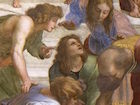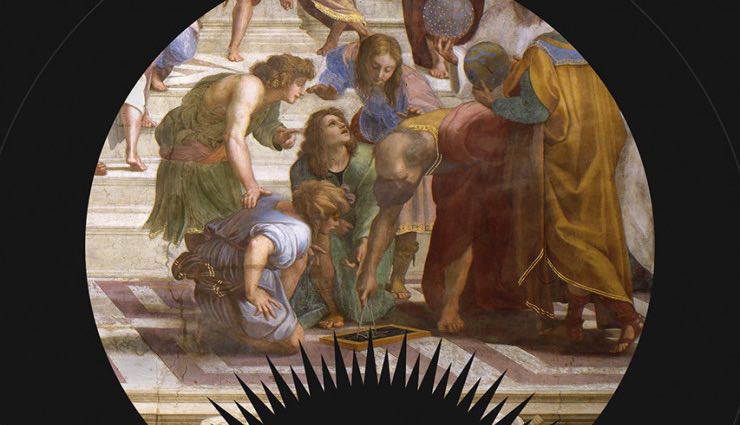Welcome back to the Tor.com eBook Club! August’s pick is The Just City, the first book in Jo Walton’s Thessaly trilogy. Join in below, as Jo discusses how she built the titular city—and its inhabitants–around Plato’s philosophy.
The thing that makes Plato so interesting to me is that he makes me go from “Yes, yes, yes” to “You cannot be serious” so fast it gives me whiplash. He’s so great on some things, and so wrong on others, so crazy, and simultaneously so thoughtful, that I can get a lot of power out of these kinds of contradictions.
People have asked if The Just City is a utopia or a dystopia, and the answer is no, it isn’t. It’s a mix of odd things, much like the real world is, some of them are better and some of them worse than what we have in our society. By the third book, Necessity, where you have a third generation who have grown up with nothing but people trying to implement Plato in different ways, you have people who take it all for granted. And then it’s a lot more like a… no, still neither a utopia nor a dystopia. A place to live. A different place. And that’s a lot more interesting to me than either absolutely perfect or absolutely awful.
Plato didn’t intend The Republic as a blueprint for a city, and the time travellers who are using it as one in my books know that. They understand that’s why he isn’t there himself. They all prayed to Athene to take them there to help set it up, and some of them are very odd people. But Plato wrote the book to make people think, and it did make people think and continues to do so after all these centuries. He wanted people to examine the societies they lived in, and consider if the way they lived really was the best way, the good life, the thing that made people the best people they could be. He also wanted people to consider what was good, what our goals should be, whether it’s happiness or love or friendship or examining everything all the time. He didn’t want anyone to try everything he suggested. He wanted it as a jumping off point for discussion. And it has been that, and nobody ever has tried it, in reality, and although it seems to me that writing about people trying it is the most obvious idea in the world, nobody else has even done that, as far as I know. Some books take some aspects of Plato’s ideas, but I’m not aware of any other novels trying this. So I was on my own.
I looked at what Plato wrote, and it’s like shooting fish in a barrel to see what’s wrong with it as written, but there are also the great things there. Part of what I did in writing the books was deciding not to implement the ideas the way I would do it, but the way the Masters would do it. The Masters are a group of philosophers, Platonic mystics, and classics majors from throughout time — from slightly ahead of Plato’s own time, through to about the end of this present century. (They have to have read Plato in Greek and then prayed to Athene to go there.) Lots of them are from the ancient world, and some of them are from the Renaissance, and most of the ones from what they call “the centuries of progress” are women, and there’s a very good reason for that. Plato says women should be equal, that they could be philosopher kings, that their souls were the same. And he said that in Book V of the Republic about 380 BC, about 2400 years ago. Very few people listened to him, so you could see how it could be appealing to women who were educated but offered very few options for living a life of the mind. So there are about three hundred of these people, and some of them are real historical people — it was the first time I’ve ever really written about real people, rather than analogs of them from other realities, or keeping them on the sidelines. Others are made up, and one of them, Maia, is rescued from a Charlotte M. Yonge novel.

Plato does really well on the gender thing. He knew women could be philosophers, his own mother was a Pythagorean philosopher, he wrote about women being equal, but he was still deeply deeply embedded in his culture, which was fundamentally one in which women barely existed as humans. It’s the same with slaves — Plato had been a slave, and he did his absolute best, in a society that absolutely required human hard labour to survive, to imagine a way to get that without buying and selling people and without having a class of hereditary slaves. His answers in both cases were revolutionary in his day, even if they look weird and reactionary to us, two and a half thousand years later.
What I thought when I was considering how these things would be implemented was that there would still be a lot of residual sexism. For example, because most of the people with technological knowledge are women, technology comes to be thought of as feminine and insignificant. They have notional equality, but it’s hard to have men who are used to knowing their voices matter pay attention to women who have been socialised into knowing theirs don’t. Then there’s the case of filling in the blanks. Plato doesn’t describe everything, and everyone is filling in the blanks their own way, and they all come from different cultures, even though they all love Greek and Roman antiquity. So that gave me more fun things to do.
 Jo Walton is a science fiction and fantasy writer. She’s published a collection of Tor.com pieces, three poetry collections and thirteen novels, including the Hugo and Nebula winning Among Others. Her most recent book is Necessity. She reads a lot, and blogs about it here from time to time. She comes from Wales but lives in Montreal where the food and books are more varied.
Jo Walton is a science fiction and fantasy writer. She’s published a collection of Tor.com pieces, three poetry collections and thirteen novels, including the Hugo and Nebula winning Among Others. Her most recent book is Necessity. She reads a lot, and blogs about it here from time to time. She comes from Wales but lives in Montreal where the food and books are more varied.










